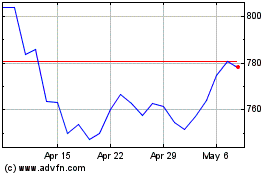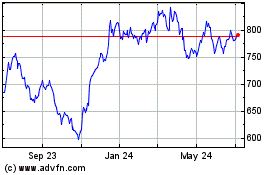The investment giant fires a fund manager whose daughter got a
part in a movie he financed
By Jason Zweig
This article is being republished as part of our daily
reproduction of WSJ.com articles that also appeared in the U.S.
print edition of The Wall Street Journal (February 29, 2020).
Take a break from the market turmoil to ponder the drama at a
little fund run by the world's biggest asset manager. It involves
allegations of fraud and forgery, not to mention a fund manager's
daughter landing a part in a movie the fund financed.
We're talking about the BlackRock Multi-Sector Income Trust. In
2017, the fund, which at that time had $750 million in net assets,
lent a tenth of that to a small, privately held movie company,
Aviron Capital LLC. It was an unusually aggressive bet. By late
2019, the fund said the loan wasn't worth anything, for a nearly
$75 million loss. In December, it filed a lawsuit against Aviron
and its owner, William Sadleir.
Mr. Sadleir denies committing fraud. He does, however, admit
copying-and-pasting signatures of a BlackRock fund executive onto
documents to accelerate the sale of $3.2 million in movie-revenue
receivables on which the fund had exclusive claim.
"I should not have done it," Mr. Sadleir said in an interview
this week. "It was bad judgment on my part. I know better."
Why did the mighty BlackRock lend so much money to a small movie
venture in the first place?
That question matters because giant investment firms should have
fail-safe procedures in place to prevent conflicts of interest and
to prevent fund managers from making arbitrarily big bets.
It also matters because investors buy a bond fund to earn steady
income, not to risk losing their principal. Multi-Sector Income
Trust has lost 3% in the past three months, while the bond market
has earned a positive 3% return, according to Morningstar. The fund
was outperformed by more than 99% of its peers over the past year,
largely because of the failed bet on Aviron.
And BlackRock charges an arm and a leg for this fund -- total
management expenses of 1.4% in 2019 -- in part to cover the costs
of carefully researching its investments. That's 22 times as much
as the firm's cheapest exchange-traded bond funds, which don't
bother researching individual holdings at all.
What's more, BlackRock, under Chief Executive Laurence Fink, has
set itself out in recent years as an arbiter of corporate
conduct.
In a twist right out of a Hollywood screenplay, Aviron, the
movie company financed by this BlackRock fund, cast the daughter of
one of the fund's managers in one of its films.
As a result, the firm fired the manager, Randy Robertson,
earlier this week after an extensive internal investigation,
according to a BlackRock spokesperson.
In a statement, BlackRock said its fund was "a victim of fraud
perpetrated by Aviron and its principal." The firm added that it is
taking "vigorous steps" to recover value for the fund's
shareholders and is moving to "enhance the level of oversight and
due diligence related to these types of transactions."
Mr. Robertson couldn't be reached for comment. His daughter,
actress Rebecca Lee Robertson, declined to comment.
BlackRock first invested in Aviron with a $12 million loan in
2015. Soon after, "we arranged for [Ms. Robertson] to meet with
casting agents and managers," says Mr. Sadleir. "Anytime there was
an opportunity to put her in a movie, we considered her."
Mr. Sadleir told me this week that Mr. Robertson agreed to
release $10 million in financing for " After," a 2019 movie from
Aviron, after the BlackRock manager learned his daughter would have
a speaking role in the film.
"I can't tell you that he made the decision purely because his
daughter was in the movie," says Mr. Sadleir, "but I can tell you
BlackRock approved that financing after turning down the
opportunity to finance several earlier movies."
Under Mr. Sadleir, Aviron has released seven films -- six
financed by the BlackRock fund -- including some notable successes.
"Kidnap," with Halle Berry, released in 2017, grossed an estimated
$35 million at the box office worldwide. Although Mr. Sadleir says
"A Private War," released in 2018, hasn't yet earned a lot of
money, it was critically acclaimed.
Mr. Robertson, a 10-year veteran of BlackRock, was the firm's
head of securitized assets, as well as co-manager of this fund. His
conduct in relation to the Aviron investment violated BlackRock's
conflict-of-interest policy, the firm said.
The BlackRock fund's investment in Aviron was unusual.
First, the commitment was extraordinarily large. In July 2017,
the fund put 10% of its net assets into Aviron. No other single
corporate issuer accounted for nearly as much of its assets at the
time. No other BlackRock fund has ever invested in Aviron, says a
BlackRock spokesperson.
Then there's Mr. Sadleir.
He served as a special assistant to the president and a deputy
secretary of state under President Ronald Reagan. He founded Dayna
Communications Inc., a networking-technology company that was
acquired by Intel Corp. in 1997. He has been in the movie business
for a decade.
However, Mr. Sadleir has had prior disputes with creditors.
A nonprofit he ran was sued in a Norwegian court in 2002 over
allegations of unpaid bills and debt. The action was later settled
by an unrelated third party. A 2015 lawsuit in California alleged
Mr. Sadleir had "misappropriated more than $3 million in
collateral," and that court in 2019 entered a judgment against him
personally for $2.7 million.
Mr. Sadleir had his own explanations for these cases, telling me
there was no misappropriation of monies.
With these disputes in the public record, why did the BlackRock
managers regard Mr. Sadleir and Aviron as a good credit risk and a
plausible bet for a tenth of the fund's assets?
One explanation: The debt was not only collateralized by
Aviron's assets, but CBL Insurance Ltd. of New Zealand also
guaranteed full payment of principal and interest, according to Mr.
Sadleir and BlackRock. What's more, motion-picture revenues tend
not to move in tandem with the stock market or other financial
assets, making the Aviron debt a potentially good diversifier.
Unfortunately, CBL Insurance became insolvent and was liquidated
by the New Zealand government late in 2018, voiding its guarantee
of the Aviron loan.
Mr. Robertson drove the decisions about the Aviron investment
all along, according to Mr. Sadleir, who says the fund manager
brought his daughter to the earliest business meeting between
BlackRock and Aviron at the movie company's offices in Los Angeles
back in 2015.
Proponents of so-called alternative assets say that such
non-traded investments offer the potential for lower risk and
higher return. As the private loan to Aviron demonstrates,
alternatives also offer greater potential for conflicts of interest
that can be difficult to detect before it's too late.
Investors should always be wary whenever a fund puts more than a
few percentage points of its assets into an obscure investment that
doesn't trade, where the sunlight can take so long to reach. If
something like this can happen at BlackRock, it can happen
anywhere.
Write to Jason Zweig at intelligentinvestor@wsj.com
(END) Dow Jones Newswires
February 29, 2020 02:47 ET (07:47 GMT)
Copyright (c) 2020 Dow Jones & Company, Inc.
BlackRock (NYSE:BLK)
Historical Stock Chart
From Mar 2024 to Apr 2024

BlackRock (NYSE:BLK)
Historical Stock Chart
From Apr 2023 to Apr 2024
